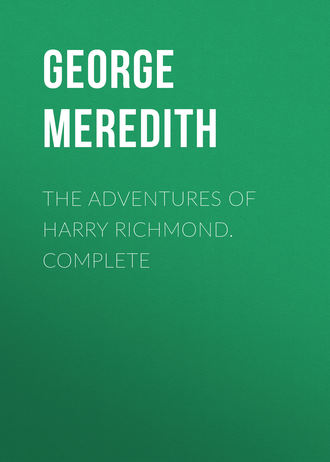
George Meredith
The Adventures of Harry Richmond. Complete
‘It happens to be my father’s present name,’ said I.
‘It sounds to me like the name of one of those blackguard adventurers who creep into families to catch the fools,’ pursued the squire, not hearing me with his eyes.
‘The letter at least must be answered,’ my aunt Dorothy said.
‘It shall be answered!’ the squire worked himself up to roar. He wrote a reply, the contents of which I could guess at from my aunt’s refusal to let me be present at the discussion of it. The letter despatched was written by her, with his signature. Her eyes glittered for a whole day.
Then came a statement of the young lady’s case from Bath.
‘Look at that! look at that!’ cried the squire, and went on, ‘Look at that!’ in a muffled way. There was a touch of dignity in his unforced anger.
My aunt winced displeasingly to my sight: ‘I see nothing to astonish one.’
‘Nothing to astonish one!’ The squire set his mouth in imitation of her.
‘You see nothing to astonish one? Well, ma’am, when a man grows old enough to be a grandfather, I do see something astonishing in a child of nineteen—by George! it’s out o’ nature. But you women like monstrosities. Oh! I understand. Here’s an heiress to fifteen thousand a year. It’s not astonishing if every ruined gambler and scapegrace in the kingdom’s hunting her hot! no, no! that’s not astonishing. I suppose she has her money in a coal mine.’
The squire had some of his in a coal-mine; my mother once had; it was the delivery of a blow at my father, signifying that he had the scent for this description of wealth. I left the room. The squire then affected that my presence had constrained him, by bellowing out epithets easy for me to hear in the hall and out on the terrace. He vowed by solemn oath he was determined to save this girl from ruin. My aunt’s speech was brief.
I was summoned to Bath by my father in a curious peremptory tone implying the utmost urgent need of me.
I handed the letter to the squire at breakfast, saying, ‘You must spare me for a week or so, sir.’
He spread the letter flat with his knife, and turned it over with his fork.
‘Harry,’ said he, half-kindly, and choking, ‘you’re better out of it.’
‘I’m the best friend he could have by him, sir.’
‘You’re the best tool he could have handy, for you’re a gentleman.’
‘I hope I shan’t offend you, grandfather, but I must go.’
‘Don’t you see, Harry Richmond, you’re in for an infernal marriage ceremony there!’
‘The young lady is not of age,’ interposed my aunt.
‘Eh? An infernal elopement, then. It’s clear the girl’s mad-head’s cracked as a cocoa-nut bowled by a monkey, brains nowhere. Harry, you’re not a greenhorn; you don’t suspect you’re called down there to stop it, do you? You jump plump into a furious lot of the girl’s relatives; you might as well take a header into a leech-pond. Come! you’re a man; think for yourself. Don’t have this affair on your conscience, boy. I tell you, Harry Richmond, I’m against your going. You go against my will; you offend me, sir; you drag my name and blood into the mire. She’s Welsh, is she? Those Welsh are addle-pated, every one. Poor girl!’
He threw a horrible tremour into his accent of pity.
My aunt expressed her view mildly, that I was sent for to help cure the young lady of her delusion.
‘And take her himself!’ cried the squire. ‘Harry, you wouldn’t go and do that? Why, the law, man, the law—the whole country ‘d be up about it. You’ll be stuck in a coloured caricature!’
He was really alarmed lest this should be one of the consequences of my going, and described some of the scourging caricatures of his day with an intense appreciation of their awfulness as engines of the moral sense of the public. I went nevertheless.
CHAPTER XXI. A PROMENADE IN BATH
I found my father at his hotel, sitting with his friend Jorian DeWitt, whom I had met once before, and thought clever. He was an ex-captain of dragoons, a martyr to gout, and addicted to Burgundy, which necessitated his resorting to the waters, causing him, as he said, between his appetites and the penance he paid for them, to lead the life of a pendulum. My father was in a tempered gay mood, examining a couple of the county newspapers. One abused him virulently; he was supported by the other. After embracing me, he desired me to listen while he read out opposing sentences from the columns of these eminent journals:
‘The person calling himself “Roy,” whose monstrously absurd pretensions are supposed to be embodied in this self-dubbed surname…’
‘—The celebrated and courtly Mr. Richmond Roy, known no less by the fascination of his manners than by his romantic history…’
‘—has very soon succeeded in making himself the talk of the town…’
‘—has latterly become the theme of our tea-tables…’
‘—which is always the adventurer’s privilege…’
‘—through no fault of his own…’
‘—That we may throw light on the blushing aspirations of a crow-sconced Cupid, it will be as well to recall the antecedents of this (if no worse) preposterous imitation buck of the old school…’
‘—Suffice it, without seeking to draw the veil from those affecting chapters of his earlier career which kindled for him the enthusiastic sympathy of all classes of his countrymen, that he is not yet free from a tender form of persecution…’
‘—We think we are justified in entitling him the Perkin Warbeck of society…’
‘—Reference might be made to mythological heroes…’
Hereat I cried out mercy.
Captain DeWitt (stretched nursing a leg) removed his silk handkerchief from his face to murmur,
‘The bass stedfastly drowns the treble, if this is meant for harmony.’
My father rang up the landlord, and said to him,
‘The choicest of your cellar at dinner to-day, Mr. Lumley; and, mind you, I am your guest, and I exercise my right of compelling you to sit down with us and assist in consuming a doubtful quality of wine. We dine four. Lay for five, if your conscience is bad, and I excuse you.’
The man smirked. He ventured to say he had never been so tempted to supply an inferior article.
My father smiled on him.
‘You invite our editorial advocate?’ said Captain DeWitt.
‘Our adversary,’ said my father.
I protested I would not sit at table with him. But he assured me he believed his advocate and his adversary to be one and the same, and referred me to the collated sentences.
‘The man must earn his bread, Richie, boy! To tell truth, it is the advocate I wish to rebuke, and to praise the adversary. It will confound him.’
‘It does me,’ said DeWitt.
‘You perceive, Jorian, a policy in dining these men of the Press now and occasionally, considering their growing power, do you not?’
‘Ay, ay! it’s a great gossiping machine, mon Roy. I prefer to let it spout.’
‘I crave your permission to invite him in complimentary terms, cousin Jorian. He is in the town; remember, it is for the good of the nation that he and his like should have the opportunity of studying good society. As to myself personally, I give him carte blanche to fire his shots at me.’
Near the fashionable hour of the afternoon my father took my arm, Captain DeWitt a stick, and we walked into the throng and buzz.
‘Whenever you are, to quote our advocate, the theme of tea-tables, Richie,’ said my father, ‘walk through the crowd: it will wash you. It is doing us the honour to observe us. We in turn discover an interest in its general countenance.’
He was received, as we passed, with much staring; here and there a lifting of hats, and some blunt nodding that incensed me, but he, feeling me bristle, squeezed my hand and talked of the scene, and ever and anon gathered a line of heads and shed an indulgent bow along them-; so on to the Casino. Not once did he offend my taste and make my acute sense of self-respect shiver by appearing grateful for a recognition, or anxious to court it, though the curtest salute met his acknowledgement.
The interior of the Casino seemed more hostile. I remarked it to him. ‘A trifle more eye-glassy,’ he murmured. He was quite at his easy there.
‘We walk up and down, my son,’ he said, in answer to a question of mine, ‘because there are very few who can; even walking is an art; and if nobody does, the place is dull.’
‘The place is pretty well supplied with newspapers,’ said Captain DeWitt.
‘And dowagers, friend Jorian. They are cousins. ‘Tis the fashion to have our tattle done by machinery. They have their opportunity to compare the portrait with the original. Come, invent some scandal for us; let us make this place our social Exchange. I warrant a good bold piece of invention will fit them, too, some of them. Madam,’—my father bowed low to the beckoning of a fan, ‘I trust your ladyship did not chance to overhear that last remark I made?’
The lady replied: ‘I should have shut my eyes if I had. I called you to tell me, who is the young man?’
‘For twenty years I have lived in the proud belief that he is my son!’
‘I would not disturb it for the world.’ She did me the honour to inspect me from the lowest waistcoat button to the eyebrows. ‘Bring him to me to-night. Captain DeWitt, you have forsaken my whist-tables.’
‘Purely temporary fits of unworthiness, my lady.’
‘In English, gout?’
‘Not gout in the conscience, I trust,’ said my father.
‘Oh! that’s curable,’ laughed the captain.
‘You men of repartee would be nothing without your wickedness,’ the lady observed.
‘Man was supposed to be incomplete—’ Captain DeWitt affected a murmur.
She nodded ‘Yes, yes,’ and lifted eyes on my father. ‘So you have not given up going to church?’
He bent and spoke low.
She humphed her lips. ‘Very well, I will see. It must be a night in the early part of the week after next, then: I really don’t know why I should serve you; but I like your courage.’
‘I cannot consent to accept your ladyship’s favour on account of one single virtue,’ said he, drooping.
She waved him to move forward.
During this frothy dialogue, I could see that the ear of the assembly had been caught by the sound of it.
‘That,’ my father informed me, ‘is the great Lady Wilts. Now you will notice a curious thing. Lady Wilts is not so old but that, as our Jorian here says of her, she is marriageable. Hence, Richie, she is a queen to make the masculine knee knock the ground. I fear the same is not to be said of her rival, Lady Denewdney, whom our good Jorian compares to an antiquated fledgeling emerging with effort from a nest of ill construction and worse cement. She is rich, she is sharp, she uses her quill; she is emphatically not marriageable. Bath might still accept her as a rival queen, only she is always behindhand in seizing an occasion. Now you will catch sight of her fan working in a minute. She is envious and imitative. It would be undoubtedly better policy on her part to continue to cut me: she cannot, she is beginning to rustle like December’s oaks. If Lady Wilts has me, why, she must. We refrain from noticing her until we have turned twice. Ay, Richie, there is this use in adversity; it teaches one to play sword and target with etiquette and retenue better than any crowned king in Europe. For me now to cross to her summons immediately would be a gross breach of homage to Lady Wilts, who was inspired to be the first to break through the fence of scandal environing me. But I must still show that I am independent. These people must not suppose that I have to cling to a party. Let them take sides; I am on fair terms with both the rivals. I show just such a nuance of a distinction in my treatment of them just such—enough, I mean, to make the flattered one warm to me, and t’ other be jealous of her. Ay, Richie, these things are trivial things beyond the grave; but here are we, my boy; and, by the way, I suspect the great campaign of my life is opening.’
Captain DeWitt said that if so it would be the tenth, to his certain knowledge.
‘Not great campaign!’ my father insisted: ‘mere skirmishes before this.’
They conversed in humorous undertones, each in turn seeming to turn over the earth of some amusing reminiscence, so rapt, that as far as regarded their perception of it, the assembly might have been nowhere. Perhaps, consequently, they became observed with all but undivided attention. My father’s hand was on my shoulder, his head toward Captain DeWitt; instead of subduing his voice, he gave it a moderate pitch, at which it was not intrusive, and was musical, to my ear charming, especially when he continued talking through his soft laughter, like a hunter that would in good humour press for his game through links of water-nymphs.
Lady Denewdney’s fan took to beating time meditatively. Two or three times she kept it elevated, and in vain: the flow of their interchangeing speech was uninterrupted. At last my father bowed to her from a distance. She signalled: his eyelids pleaded short sight, awakening to the apprehension of a pleasant fact: the fan tapped, and he halted his march, leaning scarce perceptibly in her direction. The fan showed distress. Thereupon, his voice subsided in his conversation, with a concluding flash of animation across his features, like a brook that comes to the leap on a descent, and he left us.
Captain DeWitt and I were led by a common attraction to the portico, the truth being that we neither of us could pace easily nor talk with perfect abandonment under eye-fire any longer.
‘Look,’ said he to me, pointing at the equipages and equestrians: ‘you’ll see a sight like this in dozens—dozens of our cities and towns! The wealth of this country is frightful.’
My reply, addressed at the same time mentally to Temple at sea, was:
‘Well, as long as we have the handsomest women, I don’t care.’
Captain DeWitt was not so sure that we had. The Provencal women, the women of a part of South Germany, and certain favoured spots of Italy, might challenge us, he thought. This was a point I could argue on, or, I should rather say, take up the cudgels, for I deemed such opinions treason to one’s country and an outrage to common sense, and I embarked in controversy with the single-minded intention of knocking down the man who held them.
He accepted his thrashing complacently.
‘Now here comes a young lady on horseback,’ he said; ‘do you spy her? dark hair, thick eyebrows, rides well, followed by a groom. Is she a Beauty?’
In the heat of patriotism I declared she was handsome, and repeated it, though I experienced a twinge of remorse, like what I should have felt had I given Minerva the apple instead of Venus.
‘Oh!’ he commented, and stepped down to the road to meet her, beginning, in my hearing, ‘I am the bearer of a compliment—’ Her thick eyebrows stood in a knot, then she glanced at me and hung pensive. She had not to wait a minute before my father came to her side.
‘I knew you would face them,’ she said.
He threw back his head like a swimmer tossing spray from his locks.
‘You have read the paper?’ he asked.
‘You have horsewhipped the writer?’ she rejoined.
‘Oh! the poor penster!’
‘Nay, we can’t pretend to pity him!’
‘Could we condescend to offer him satisfaction?’
‘Would he dare to demand it?’
‘We will lay the case before Lady Wilts to-night.’
‘You are there to-night?’
‘At Lady Denewdney’s to-morrow night—if I may indulge a hope?’
‘Both? Oh! bravo, bravo! Tell me nothing more just now. How did you manage it? I must have a gallop. Yes, I shall be at both, be sure of that.’
My father introduced me.
‘Let me present to your notice my son, Harry Lepel Richmond, Miss Penrhys.’
She touched my fingers, and nodded at me; speaking to him:
‘He has a boy’s taste: I hear he esteems me moderately well-favoured.’
‘An inherited error certain to increase with age!’
‘Now you have started me!’ she exclaimed, and lashed the flanks of her horse.
We had evidently been enacting a part deeply interesting to the population of Bath, for the heads of all the strolling groups were bent on us; and when Miss Penrhys cantered away, down dropped eyeglasses, and the promenade returned to activity. I fancied I perceived that my father was greeted more cordially on his way back to the hotel.
‘You do well, Richie,’ he observed, ‘in preserving your composure until you have something to say. Wait for your opening; it will come, and the right word will come with it. The main things are to be able to stand well, walk well, and look with an eye at home in its socket: I put you my hand on any man or woman born of high blood.—Not a brazen eye!—of the two extremes, I prefer the beaten spaniel sort.—Blindfold me, but I put you my hand on them. As to repartee, you must have it. Wait for that, too. Do not,’ he groaned, ‘do not force it! Bless my soul, what is there in the world so bad?’ And rising to the upper notes of his groan: ‘Ignorance, density, total imbecility, is better; I would rather any day of my life sit and carve for guests—the grossest of human trials—a detestable dinner, than be doomed to hear some wretched fellow—and you hear the old as well as the young—excruciate feelings which, where they exist, cannot but be exquisitely delicate. Goodness gracious me! to see the man pumping up his wit! For me, my visage is of an unalterable gravity whenever I am present at one of these exhibitions. I care not if I offend. Let them say I wish to revolutionize society—I declare to you, Richie boy, delightful to my heart though I find your keen stroke of repartee, still your fellow who takes the thrust gracefully, knows when he’s traversed by a master-stroke, and yields sign of it, instead of plunging like a spitted buffalo and asking us to admire his agility—you follow me?—I say I hold that man—and I delight vastly in ready wit; it is the wine of language!—I regard that man as the superior being. True, he is not so entertaining.’
My father pressed on my arm to intimate, with a cavernous significance of eyebrow, that Captain DeWitt had the gift of repartee in perfection.
‘Jorian,’ said he, ‘will you wager our editor declines to dine with us?’
The answer struck me as only passable. I think it was:
‘When rats smell death in toasted cheese.’
Captain DeWitt sprang up the staircase of our hotel to his bedroom.
‘I should not have forced him,’ my father mused. ‘Jorian DeWitt has at times brilliant genius, Richie—in the way of rejoinders, I mean. This is his happy moment—his one hour’s dressing for dinner. I have watched him; he most thoroughly enjoys it! I am myself a quick or slow dresser, as the case may be. But to watch Jorian you cannot help entering into his enjoyment of it. He will have his window with a view of the sunset; there is his fire, his warmed linen, and his shirt-studs; his bath, his choice of a dozen things he will or will not wear; the landlord’s or host’s menu is up against the looking-glass, and the extremely handsome miniature likeness of his wife, who is in the madhouse, by a celebrated painter, I forget his name. Jorian calls this, new birth—you catch his idea? He throws off the old and is on with the new with a highly hopeful anticipation. His valet is a scoundrel, but never fails in extracting the menu from the cook, wherever he may be, and, in fine, is too attentive to the hour’s devotion to be discarded! Poor Jorian. I know no man I pity so much.’
I conceived him, I confessed, hardly pitiable, though not enviable.
‘He has but six hundred a year, and a passion for Burgundy,’ said my father.
We were four at table. The editor came, and his timidity soon wore off in the warmth of hospitality. He appeared a kind exciteable little man, glad of his dinner from the first, and in due time proud of his entertainer. His response to the toast of the Fourth Estate was an apology for its behaviour to my father. He regretted it; he regretted it. A vinous speech.
My father heard him out. Addressing him subsequently,
‘I would not interrupt you in the delivery of your sentiments,’ he said. ‘I must, however, man to man, candidly tell you I should have wished to arrest your expressions of regret. They convey to my mind an idea, that on receipt of my letter of invitation, you attributed to me a design to corrupt you. Protest nothing, I beg. Editors are human, after all. Now, my object is, that as you write of me, you should have some knowledge of me; and I naturally am interested in one who does me so much honour. The facts of my life are at your disposal for publication and comment. Simply, I entreat you, say this one thing of me: I seek for justice, but I never complain of my fortunes. Providence decides:—that might be the motto engraven on my heart. Nay, I may risk declaring it is! In the end I shall be righted. Meanwhile you contribute to my happiness by favouring me with your society.’
‘Ah, sir,’ replied the little man, ‘were all our great people like you! In the country—the provinces—they treat the representatives of the Fourth Estate as the squires a couple of generations back used to treat the parsons.’
‘What! Have you got a place at their tables?’ inquired Captain DeWitt.
‘No, I cannot say that—not even below the salt. Mr. Richmond—Mr. Roy, you may not be aware of it: I am the proprietor of the opposition journals in this county. I tell you in confidence, one by itself would not pay; and I am a printer, sir, and it is on my conscience to tell you I have, in the course of business, been compelled this very morning to receive orders for the printing of various squibs and, I much fear, scurrilous things.’
My father pacified him.
‘You will do your duty to your family, Mr. Hickson.’
Deeply moved, the little man pulled out proof-sheets and slips.
‘Even now, at the eleventh hour,’ he urged, ‘there is time to correct any glaring falsehoods, insults, what not!’
My father accepted the copy of proofs.
‘Not a word,—not a line! You spoke of the eleventh hour, Mr. Hickson. If we are at all near the eleventh, I must be on my way to make my bow to Lady Wilts; or is it Lady Denewdney’s to-night? No, to-morrow night.’
A light of satisfaction came over Mr. Hickson’s face at the mention of my father’s visiting both these sovereign ladies.
As soon as we were rid of him, Captain DeWitt exclaimed,
‘If that’s the Fourth Estate, what’s the Realm?’
‘The Estate,’ pleaded my father, ‘is here in its infancy—on all fours—’
‘Prehensile! Egad, it has the vices of the other three besides its own. Do you mean that by putting it on all fours?’
‘Jorian, I have noticed that when you are malignant you are not witty. We have to thank the man for not subjecting us to a pledge of secresy. My Lady Wilts will find the proofs amusing. And mark, I do not examine their contents before submitting them to her inspection. You will testify to the fact.’
I was unaware that my father played a master-stroke in handing these proof-sheets publicly to Lady Wilts for her perusal. The incident of the evening was the display of her character shown by Miss Penrhys in positively declining to quit the house until she likewise had cast her eye on them. One of her aunts wept. Their carriage was kept waiting an hour.
‘You ask too much of me: I cannot turn her out’, Lady Wilts said to her uncle. And aside to my father, ‘You will have to marry her.’
‘In heaven’s name keep me from marriage, my lady!’ I heard him reply.
There was sincerity in his tone when he said that.






